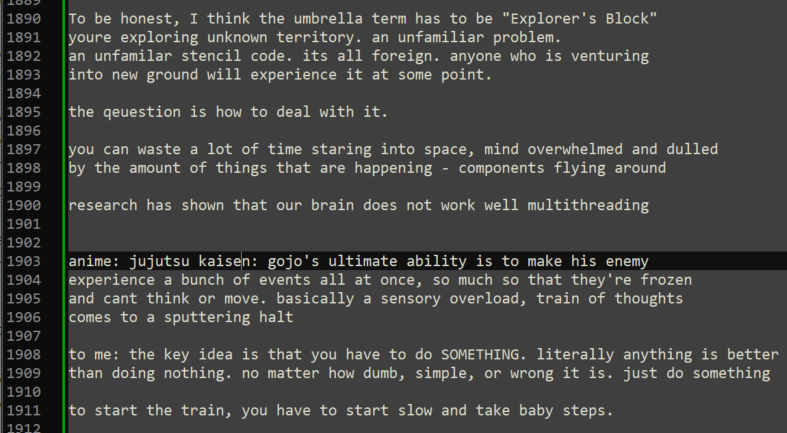Explorer's Block
The Wikipedia page for writer’s block is vague and general, describing it as the inability to write for any reason, but I’d like to operate for this post under the following simple definition: need to write, have ideas, but can’t seem to produce sentences to express them.
Writer’s block is really just an example of a generalized psychological sensation characterized by feeling that ideas exist but don’t seem to be manifesting or formulating concretely into actions. This can happen in any field that requires creative problem solving or demands an immense amount of concentration and effort. For example, it’s happened personally in both computer science and mathematics - a “programmer’s block” and “mathematician’s block,” respectively, if you will.
I feel like this sensation is inevitably experienced by anyone pushing the boundaries of what they know. A wave of new concepts and unfamiliarity swarm our minds, causing the train of thought to sputter to a halt. Well, of course: what type of idiot train conductor would keep going full steam ahead into an unmapped and potentially hazardous region? Hence, the title of the post: I’ll call this umbrella sensation explorer’s block.
Before discussing further, I want to distinguish explorer’s block from “not having any ideas” - Wikipedia would probably treat them as the same, but I believe they are definitely distinct. The main cause of “not having any ideas” is lack of knowledge and intuition. On the other hand, I think explorer’s block is rooted in attacking a problem of overwhelming complexity. However, as I’ll discuss later, the coping strategies can be quite similar.
Domain Expansion
“Ironic isn’t it? When granted everything, you can’t do anything…”
In one of my favorite recent anime, Jujutsu Kaisen, Gojo Satoru, undoubtedly the strongest character in the show, has a special ability (called a “Domain Expansion”) which forces the unfortunate victim to perform and experience all actions required to live an infinite number of times. The victim experiences a sensory overload of sorts, where they are unable to think, perceive, or move in this realm of limitlessness and divergence.

When I open up that daunting CS project for the first time, see how small the scroll bar on the side of the browser is, and start reading the assignment specification, it’s almost like getting caught in a mini version of Gojo’s Domain Expansion. Or a problem set, where after reading the first problem, my mind goes blank. I’ve really been trying to figure out why, and I’ve decided it reduces to my brain overheating and trying to process all of the (which is way too much) information at once. I end up trying to multithread my brain, which research has shown is definitely not optimal, especially in a task where each thread is resource-hungry. I easily get trapped overthinking about all of the concepts - how I’m going to do X, how I’m going to do Y, etc. only to eventually realize I haven’t done anything at all and 30 minutes have passed.
So, I think it's fair to conclude that explorer's block is a relevant problem. What to do?
Solutions
The most effective strategy personally has been to just do something. No matter how dumb, naive, or maybe straight up wrong it is - as long as I do something, it helps drastically with my efficiency and progress. 20 lines of wrong code is better than 0 lines - not only is it 20 lines, but also I know they’re wrong. I’ve gained some intuition about the problem just from realizing why the code is wrong (to an extent, of course). The train can’t instantly start going full speed again - it needs to warm up through baby steps.
When using this strategy to specifically address writer’s block, it’s known as “freewriting.” This is my main strategy for writing blog posts: I vomit all of the ideas in my head onto the page first in an often unorganized and typo-filled manner, mainly to get started and clear out headspace. Anything that comes to mind, I just write it down. Later on, I’ll come back and organize, revise, and polish the mess.

However, freewriting can be extended to more than just writing. As an example, for my current fundamentals of systems class, one of the easiest ways to accomplish this “do something”/freewriting strategy is to just run make clean all (the compiler) or run the test suite on the stencil code. It’s a quick way to start getting my hands dirty with the project by running something. Alternatively, when attacking a new math problem, trying simple examples or attacking lower dimensional cases are extremely potent methods and examples of “doing something.”
I think the “do something” strategy is effective because it reduces the need to multithread and forces your brain to start thinking increasingly deeply about the tricky topic. More often than not, this strategy is enough for me to restart my train of thought and start cruising again, and enter the “flow state” where I become immersed in the work. Thinking about it game-theoretically, the worst that can arise from explorer’s block is additional time lost from being overwhelmed, so “doing something” is always a weakly dominant strategy.
Different strategies work for different people. One of my friends, who partly inspired me to reflect deeper about explorer’s block, said that for him that it’s just a mindset thing - he just needs to commit mentally to devoting attention to the project, and that’s what gets him going and lets him enter “the zone.”
At this point, I’ve written so many posts related to psychology and neuroscience that I should probably just take a course in these at some point… probably a human cognition course next semester 😄